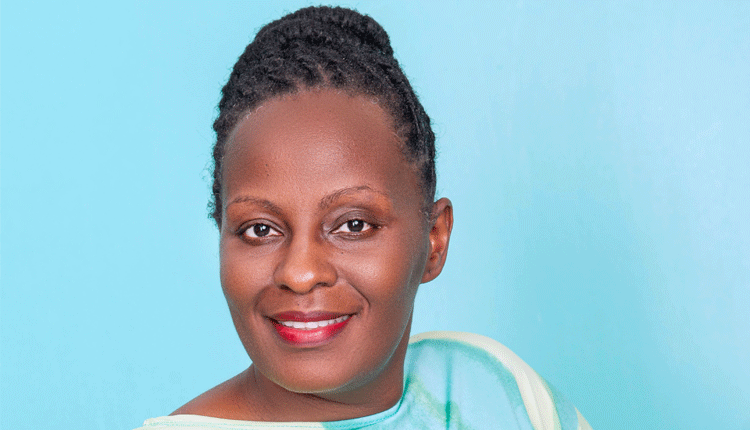How passion to care for others birthed my business

For Grace Njiru, taking care of people is second nature. She has always been passionate about caring for individuals, families and communities, so that they are able to attain, maintain and recover optimal health and quality life.
This zeal, has seen her start a home-based care agency, Chesed Home Healthcare, that support daily living activities, wound management, toilet support, diet planning and nutrition advice, geriatric nursing, antenatal and Lamaze methods and preparing, transporting and accompanying patients.
The genesis
Growing up, Njiru was passionate about nursing. Every time she got an opportunity, she would play a role as a nurse in drama festivals.
“I always loved how nurses dressed, and basically how much love and care they gave their patients. This made me want to take the minor roles in the skits we had in our school.
I remember one time in Class Two, the late president Daniel Arap Moi was touring the district, and I got an opportunity to act as a nurse.
I was to wear a nurse cap and I made my mother hand stitch one for me to have the full attire,” she recalls.
To fulfill her dreams, she worked hard in school and eventually landed at the Kenya Medical Training College, where she trained to be a certified nurse.
In 2005, after three years of training, she got a job at Nazareth Hospital in Kiambu, where she worked in the new born unit for six months. She was later appointed to be the assistant maternity in-charge.
Two years later after her maternity leave, she got a request from Nazareth Medical College to join the teaching faculty to train nurses on nursing theory and practice.
“I knew it was a demanding job, and I didn’t shy away. I joined the teaching faculty as an assistant tutor then later as a full-time tutor.
My role was to mentor young nurses coming into training, and assist in teaching,” she says.
During the seven years she worked as a nurse, she brought some innovations, and worked at the head department in general nursing.
She later resigned while serving as the deputy principal at Nazareth Hospital.
After working as a nurse for so long, Njiru knew that It was about time she took bigger challenges in her career.
“Someone had challenged me to step out of my comfort zone. At around that time, an opportunity of going to South Sudan came.
A faith-based organisation needed someone to set up a maternity wing for the host community and I knew I was the right person for the job” she says.
Although her family tried to deter her from going because of the war and insecurity in Juba, she didn’t change her mind.
In 2013, she left for South Sudan. She termed this as the beginning of something new, but her expectations didn’t match what she experienced when she landed in the country.
“I knew the situation was bad, but I didn’t know that we would be staying in a grass thatched hut.
That was my biggest culture shock because I didn’t know if I was going to survive that environment,” says Njiru.
Even after her contract was renewed, she craved for something better, this time her target was a non-governmental organisation in the same environment.
“I felt like I had become resilient and this time it was paying off; I had gotten used to the routine of working for three months then taking a three-week break. So, I started working with the refugees,” she says.
Care at home
While in Juba, her grandmother got really ill. This worried her because there was nothing much she could do.
She had been bedridden for three months and her health was deteriorating.
“I remember one time during my short visits home, she appeared to be really sick.
I gave my aunt an option of getting her a caregiver, but she didn’t know what we were talking about.
They spent so much time looking for a caregiver and found one after a long search,” she says.
She believes her grandmother’s fate would have been different if they had gotten a good caregiver.
“The elderly need a lot of attention, especially when it comes to feeding and medication.
If there is no one to spot this problem then they develop complications,” she explains.
In 2018, after her grandmother’s burial, Njiru decided to embark on her mission to set up a home-based care agency.
She quit her job to focus on her new found interest. This time, she was determined to educate people on home-based care, especially on patients who didn’t need hospital cares to get better.
“I just wanted people to know that there are illnesses that patients don’t need to be in hospital for.
All they do is accumulate bills, yet they can be managed at home,” she says.
Although there is a perspective that home-based care is expensive, Njiru says it is affordable quality care.
For the past few years, people’s perception about home-based care has changed.
Now more than ever, people are embracing it after they find out how affordable this method of treatment is.
At Chesed Home, for instance, their services depend on whether the patient is dependent or not.
They have to understand the patient’s needs to determine their package and how much they would have to pay. However, their price range from Sh1,500 to Sh10,000 per day.
“Once we get a client, we do an assessment to determine which patients to match a caregiver.
This is determined by the age, gender and situations in place. All this need to be sorted before the placement of a caregiver,” she adds.
One of the challenges that Njiru has had to deal with at the beginning was visibility and presence.
She recalls how the launch happened right after Covid-19 pandemic struck and they were stuck on how they would be able to reach a variety of people.
Also, the fact that there are patient aides that are posing as nurses makes it a challenge because people fall into traps of uncertified people.
Patients aide and nurses are two different people, and an aide shouldn’t take up tasks that nurses do.
In future, Njiru hopes to get an ambulance to use in cases where they need to transport patients to facilities.
She is also looking at a point where we will have a geriatric hospital that deals exclusively with the elderly.












